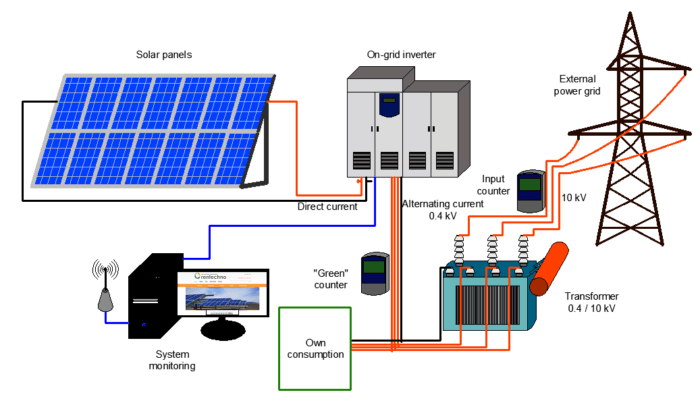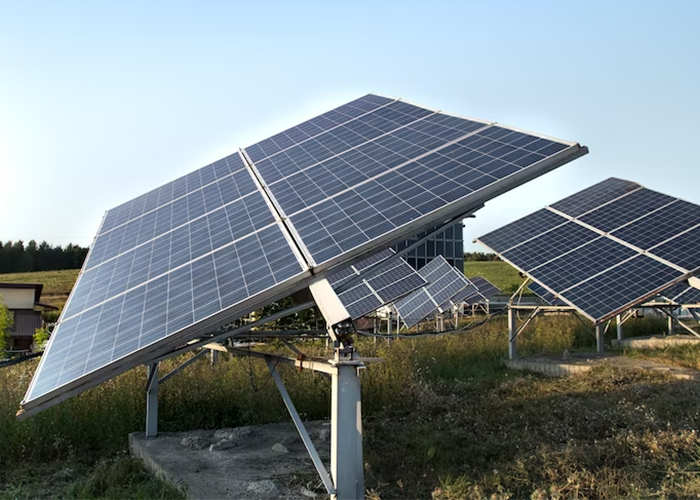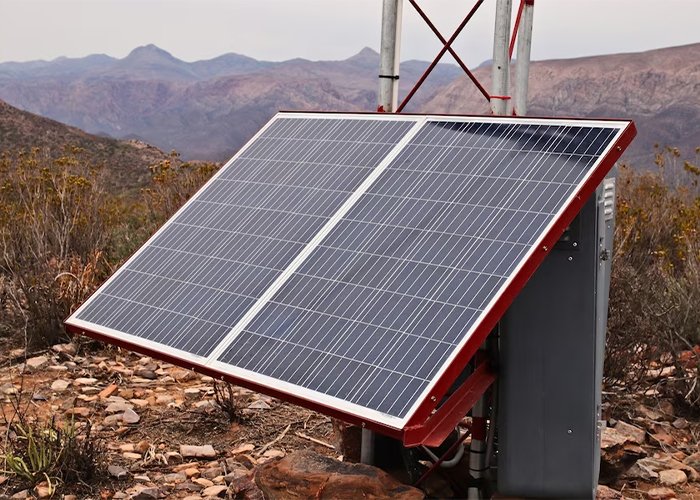1-MW SOLAR POWER PLANT
HOME >> 1-MW SOLAR POWER PLANT
1-MW SOLAR POWER PLANT
High-capacity systems of over 100kW are called Solar Power Stations, Energy Generating Stations, or Ground Mounted Solar Power Plants. A 1MW solar power plant of 1-megawatt capacity can run a commercial establishment independently. This size of solar utility farm takes up 4 to 5 acres of space and gives about 4,000 kWh of low-cost electricity every day. Surplus power can subsequently be sold to the government utility company as per the net metering mechanism.
The Working of a 1MW Solar Power Plant
Solar photovoltaic panels do the same thing in all residential and commercial compositions regardless of the 1MW solar power plant cost or type. They absorb sunshine to generate clean solar electricity. The panel’s surface contains multiple strings of solar cells (made up of silicon alloys) which lose their electrons. It happens in response to a change in their electrical field caused by photons present in sunlight. The drifting elections generate a flow of direct current. This is called the ‘Photovoltaic Effect’.The energy passes through a series of wires to an inverter and gets converted into AC electricity suitable to be used by your electronics and appliances. The strategic arrangement of solar panels requires careful consideration of correct wiring, angle, and orientation. This is important to ensure optimum sunlight exposure so that the panels give you maximum output during the peak sunlight hours.

1 Megawatt Solar Power Plant Cost & Specifications
| Particulars | Estimated Cost |
|---|---|
| Solar Panels | 3 Crore |
| Solar Inverter | 1 Crore |
| Combiners + Junction Boxes | 20 Lakh |
| Protective Gears Arrangement | 10 Lakh |
| SCADA & Data Logger System | 7 Lakh |
| Land Bank | *5 Acre |
| Erection of Project | 50 Lakh |
| Total Project Cost | 5.00Cr. (Approx.) |
On average, the cost of a 1MW solar power plant in India ranges between Rs 4 – 5 crores. Several factors influence the initial solar investment. The key component making up a solar power plant is the solar panel which comes in various forms. Crystalline solar panels (monocrystalline and polycrystalline) are commonly used in most solar energy frameworks.The monocrystalline version comes with a higher efficiency rating and thus increases the cost of your solar power plant in India. Similarly, there are many other considerations that a consumer is required to make to put together the most suitable solar plant for their business.
Note: The above figures are for illustration purpose only and represents an estimated idea of what the cost might be. The accurate 1MW solar power plant cost and profit require an on-site solar assessment and a personalized quote from a professional solar company.
Key specifications of a 1MW solar power plant
| Key components | Solar panels, solar mounting structure, solar inverter, solar batteries (optional), the balance of system (cables, fuses, MCBs, and Distribution boxes) |
| Energy output | Wonder how many units your 1MW solar power plant can produce? – 4,000 kWh of electricity per day – 1,20,000 kWh of electricity per month – 14,40,000 kWh of electricity per year |
| Area required | 4 to 5 acres of land is required for 1MW solar plant |
Different Types of 1MW Solar Power Plants
There are three types of solar plants that work on the same principle of ‘Photovoltaic Effect’. Each type of solar framework requires a different combination of solar components and thus determines your 1MW solar power plant cost in India. Your location, monthly energy requirements, and availability of space determine which of the following types of systems suit you best and give you maximum returns on your solar investment.

On-grid 50kW solar system (regulated under the net metering mechanism)

Off-grid 50kW solar system (suitable for remote locations)

Hybrid 50kW solar system (connects to the grid and also includes solar batteries)
1MW On-grid Solar Power Plant Specifications
In an on-grid framework, the cost of your 1MW solar plant is the lowest among all types of solar plants. This is because solar panels and solar inverters are the only key components you need to set up an on-grid plant. On-grid means your 1MW solar power plant is connected to the government grid and regulated under the net metering mechanism.Net metering facilitation allows your solar panels to sell unused solar power units to the utility company and receive solar credits. This becomes a type of passive income on your 1MW solar power plant. Likewise, you can withdraw grid power when your solar panels’ generation capacity falls below the standard.
1MW Off-grid Solar Power Plant Specifications
An off-grid framework works like an independent solar power station. It supplies free electricity to power your business and stores the surplus energy for later use. In addition to solar panels and the solar inverter, a solar battery bank is required to capture unused power units and create an invaluable energy reserve on-site for your business.The inclusion of solar batteries increases the 1MW solar power plant cost, although the advantages still outweigh the cost. With the reliance on solar batteries, your business can thrive in remote locations where grid accessibility is costly or unavailable. By eliminating your dependence on the government grid, you also eliminate your electricity bills.
1MW Hybrid Solar Power Plant Specifications
A hybrid framework is the best way to discover your location’s true solar potential and reap this green technology’s maximum advantages. This type of solar plant combines the best of both on-grid and off-grid plants. Your hybrid solar plant has net metering advantages and also the reliability of solar batteries.As a result, this type of 1MW solar power plant can help you achieve absolute energy independence and also ensure a 24-hour supply of electricity, meaning no downtime for your business.
Types of Investment Models
If you are looking to get a 1MW solar power plant for your business or industry, you can choose to invest in your plant through either of the two models.

CAPEX Model (One-Time Investment)
In the CAPEX or one-time investment model, the consumer chooses to make an upfront capital expenditure. As you settle the entire cost of the 1MW solar power plant with your solar energy company, you become the owner of your solar plant and all the energy it generates.As a solar power owner, you benefit from the supply of free-of-cost, clean electricity for the next 25+ years. This type of investment model is more suitable for purchasing systems of 100kW or less capacity for commercial or residential use.

OPEX or PPA Model
The cost of a 1MW solar power plant in India in 2023 can be overwhelming for many commercial establishments. However, an easy way to switch to solar and get a high-capacity plant is through third-party financing options. In this model, you’ll only have to bear the operational expenditure of your solar power plant and enjoy its benefits.A solar energy company installs your solar plant at zero cost for a Power Purchase Agreement (PPA) of 10-25 years. After the installation of your solar plant, you pay a per-unit price every month at a rate lesser than the grid tariff.
Income From 1MW Solar Power Plant
Many factors affect the income from your 1MW solar power plant. These include annual power consumption, the daily energy output of your solar panels, and the purchase policies and prices offered by the government. This income or return on the solar investment eventually helps you recover the initial cost within 6-8 years – called the average payback period.
| Particulars | Description |
|---|---|
| Average Daily energy output | 4000 kWh |
| Annual energy output | 4000×365=14,60,000 units |
| Govt. pays per unit | 3.85 ₹/unit [According to Central Electricity Regulatory Commission (CERC)] |
| Total income over the year | ₹56,21,000 |
| Net income over the year | ₹43,51,000 (Total income – Annual Maintenance Cost) |
1MW Solar Power Plant Project Report
Here is a 1MW solar power plant project report to showcase an estimated series for this system capacity.
| Particulars | Description |
|---|---|
| Power Plant Capacity | 1-megawatt |
| Annual power generation | 14.60 Lakh (On Average) |
| Degradation over the first decade (1 to 10 years) | 0.05% per year |
| Degradation from 11 to 25 years | 0.67% per year |
| Debt Percentage | 70% |
| Equity Percentage | 30% |
| Rate of Interest (Indian) | 13.0% |
| Rate of Interest (Foreign) | 10% |
| Repayment Period (Indian) | 11 years |
| Repayment Period (Foreign) | 15 Years |
| Percentage of Indian Loan | 70% |
| Sale of Electricity | Rs.6.49 |
| Cost of Project (per MW) | 450 Lakh |
| O&M Cost (per MW) | 8 Lakh/year |
| Depreciation | 5.28% |
| Corporate Tax | 30.28% |
| Minimum Alternate Tax | 18.38% |
| Project Cost | 450 Lakh |
| Debt | 355 Lakh |
| Equity | 95 Lakh |
Frequently Asked Questions
On average, a 1kW solar system requires a shade-free area of 6 square meters. Accordingly, to set up solar panels of 1 megawatt, you need over 6000 square meters of land. The number of solar panels required and the mounting structure also affect the total 1MW solar power plant area required for installation.
Both models have their own set of pros and cons. If your business can make the required capital expenditure, you can easily become a solar owner. On the other hand, if you don’t have the flexibility of paying a heavy amount in one go, you can consider signing the PPA agreement under the CAPEX model. This way you pay a much lesser per-unit tariff rate on a monthly basis for a period of 10-25 years.
Is it difficult to operate and maintain a big power plant of 1-megawatt capacity? Operating and maintaining your 1MW solar power plant is easier than you think. Solar panels require a basic cleaning routine and use a simple cleaning kit. Keeping your solar panels’ surface free of any accumulation is important to maintain their efficiency levels.
